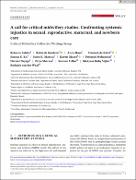A call for critical midwifery studies: Confronting systemic injustice in sexual, reproductive, maternal, and newborn care
| dc.contributor.author | Ashley, Rebecca | |
| dc.contributor.author | Goodarzi, Bahareh | |
| dc.contributor.author | Horn, Anna | |
| dc.contributor.author | de Klerk, Hannah | |
| dc.contributor.author | E. Ku, Susana | |
| dc.contributor.author | Marcus, Jason K. | |
| dc.contributor.author | Mayra, Kaveri | |
| dc.contributor.author | Mohamied, Fatimah | |
| dc.contributor.author | Nayiga, Harriet | |
| dc.contributor.author | Sharma, Priya | |
| dc.contributor.author | Udho, Samson | |
| dc.contributor.author | Vijber, Madyasa Ruby | |
| dc.contributor.author | van der Waal, Rodante | |
| dc.date.accessioned | 2022-08-23T19:08:15Z | |
| dc.date.available | 2022-08-23T19:08:15Z | |
| dc.date.issued | 2022 | |
| dc.identifier.uri | https://hdl.handle.net/123456789/431 | |
| dc.description.abstract | ystemic injustice is a threat to sexual, reproductive, ma- ternal, and newborn (SRMN) health. The effects of this injustice are reflected in the high maternal and neonatal morbidity and mortality rates in former colonized coun- tries of the Global South, in marginalized communities of the Global North, and in underprivileged classes around the world. 1 Current research, clinical guidance, and global health politics all point to an inadequate response to in- justice on the part of SRMN care systems. Consider, for instance, four examples of ongoing injustices globally: the lack of workforce to meet SRMN, 2 the lack of access to safe abortion, 3 the “ethnic”, “racial”, and socioeconomic disparities present in maternal and newborn outcomes during the Covid-19 pandemic,4,5 and the severity and persistence of obstetric violence and obstetric racism. | en_US |
| dc.language.iso | en | en_US |
| dc.publisher | Wiley | en_US |
| dc.subject | critical midwifery studies | en_US |
| dc.subject | reproductive | en_US |
| dc.title | A call for critical midwifery studies: Confronting systemic injustice in sexual, reproductive, maternal, and newborn care | en_US |
| dc.type | Article | en_US |
Files in this item
This item appears in the following Collection(s)
-
Research Articles [12]

